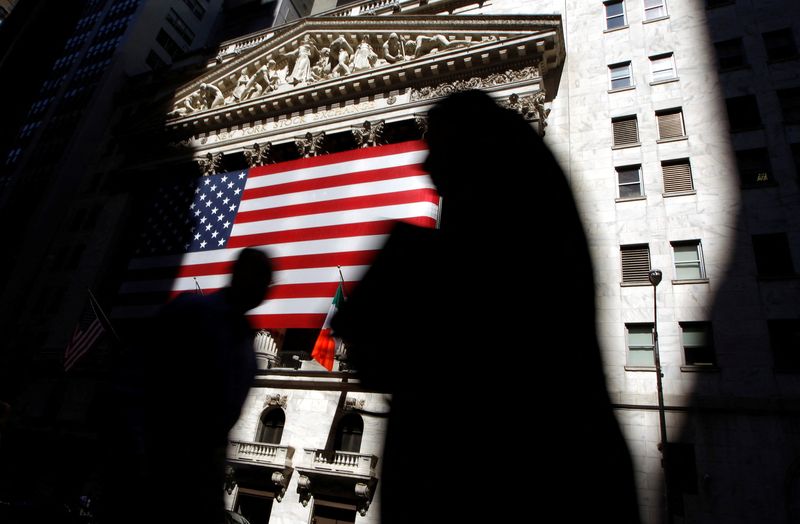Investing.com -- Apple (NASDAQ:AAPL) shares hug the flatline in premarket trading on Friday following a two-day skid sparked by reports that China is telling government officials not to use the California company's iPhone device for work. Elsewhere, two more Federal Reserve policymakers hint that the central bank may skip hiking interest rates at its September gathering, while U.S. Treasury Secretary Janet Yellen suggests that China's post-COVID economic woes may not have a "significant impact" on the United States.
1. Nasdaq futures inch down after Apple-driven decline
U.S. stock futures pointed lower on Friday, as investors gauged a sharp drop in Apple's stock this week and weighed the possibility of more Federal Reserve rate hikes this year.
At 05:53 ET (09:53 GMT), the Dow futures contract lost 61 points or 0.2%, S&P 500 futures fell by 10 points or 0.2%, and Nasdaq 100 Futures shed 45 points or 0.3%.
The main indices on Wall Street were mixed at the close of trading on Thursday, with the 30-stock Dow Jones Industrial Average edging up 0.2% and the benchmark S&P 500 dipping by 0.3%.
Attention widely centered around a Wall Street Journal report that central government officials in China had been ordered not to use Apple's iPhone and other foreign-branded mobile devices for work, which traders took as a potential sign that Beijing may be willing to sideline American tech companies in favor of their Chinese counterparts. A separate report from the Financial Times said that state employees across China have also been told to cease using iPhones.
Shares in Apple, which relies on China for almost a fifth of its total revenue and is set to unveil the latest model of its mega-popular iPhone next week, slumped to a second consecutive day of losses, dragging the tech-heavy Nasdaq Composite down by 0.9%.
2. Apple stabilizes premarket after two-day tumble
Apple shares held near the flatline in premarket U.S. trading on Friday following a slide of about 6% over the past two sessions that has now wiped close to $200 billion in value off of the stock's market capitalization.
The losses had a wide-spread impact in Asia, particularly on Apple's regional suppliers. South Korea's SK Hynix (KS:000660), which supplies Apple with memory chips, fell by 4.1%, while phone display-provider Samsung Electronics (KS:005930) shed 0.1%.
Taiwan’s TSMC (TW:2330) dipped by 0.7%, while display manufacturer Japan Display (TYO:6740) decreased by 2.5%. In China, Luxshare Precision Industry (SZ:002475), a source of connector cables for a slew of Apple devices, dropped 3.2%.
Hong Kong-listed supplier AAC Technologies (HK:2018), a builder of Apple's AirPods headphones, was down nearly 6% this week, although the stock did not trade on Friday due to a broader trade suspension in Hong Kong.
3. Fed officials back rate pause
Senior officials on the Federal Reserve's policy-setting committee on Thursday seemingly threw their support behind keeping interest rates steady at the central bank's upcoming meeting later this month.
Speaking at a Bloomberg event, John Williams, New York Fed President and voting member of the Federal Open Market Committee, suggested that rates are currently "in a good place." Williams added, however, that it is an "open question as we go forward" whether the Fed would need to continue tightening policy to help slow the economy to a point that cools inflation down to its 2% target.
Elsewhere, Dallas Fed President Lorie Logan -- widely considered to be one of the more hawkish FOMC voters -- said that it would be "appropriate" to keep the benchmark federal funds rate at a 22-year high of 5.25% to 5.50% this month.
Fed Governor Christopher Waller also backed a rate pause earlier this week, telling CNBC that recent U.S. economic data did not indicate that policymakers needed to take "imminent" action.
The comments were some of the last investors will hear from Fed officials before a customary black-out period ahead of their two-day gathering scheduled for Sept. 19-20.
4. Crude reverses losses
Oil prices gained on Friday, paring back earlier losses despite lingering concerns over the health of the crucial Chinese economy and a stronger dollar.
Both benchmarks are on course for weekly gains of around 2%, a rally that has been broadly driven by news that top producers Saudi Arabia and Russia have extended their voluntary supply cuts to the end of the year.
Additionally, data released late Thursday showed that U.S. inventories shrank a hefty 6.3 million barrels in the week to September 1, falling for the fourth consecutive week.
By 05:54 ET, the U.S. crude futures traded 0.2% higher at $87.08 a barrel, while the Brent contract added 0.4% to $90.25 per barrel.
5. Yellen addresses China slowdown
U.S. Treasury Secretary Janet Yellen predicted that China's sputtering post-pandemic recovery will likely not take a major toll on the American economy, but could hit east Asian countries hard.
In a speech at the G20 summit of world leaders in India, Yellen said she does not see China's downturn having a "very significant direct impact" on the U.S., although she noted that Washington is monitoring the situation closely.
Yellen added that Beijing does have "policy space" to help reignite growth in the world's second largest economy, which has been slammed by contracting exports, a weakening manufacturing industry and a property sector liquidity crisis.
China has yet to roll out large-scale stimulus measures despite increasing calls to do so. Officials have instead opted to introduce measures to prop up specific industries or support the local currency, which finished its domestic session on Friday at its weakest level since the global financial crisis.
